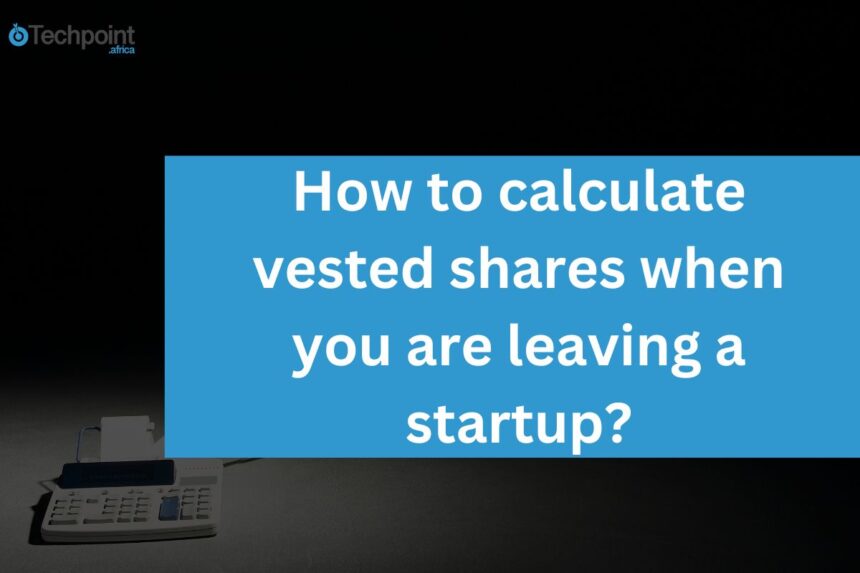What happens to unvested shares?
Unvested shares are typically forfeited when you leave a company unless your employer allows for accelerated vesting. In some cases, you may be able to negotiate with your employer to retain a portion of unvested shares, especially if you are leaving on good terms or due to circumstances beyond your control.
Managing vested shares after leaving
Once you have calculated the value of your vested shares, you have several options for managing them:
- Exercise stock options: If you have stock options, you can choose to exercise them and purchase the underlying stock at the predetermined price. This allows you to own the stock outright and potentially benefit from any future price increases.
- Sell vested shares: You can sell your vested shares on the open market, either immediately after leaving the company or at a later date. This allows you to cash out your equity and realize the value of your shares.
- Transfer vested shares: You may also have the option to transfer your vested shares to a brokerage account or another investment vehicle. This can be a strategic move if you want to diversify your investment portfolio or take advantage of other investment opportunities.
Before making any decisions about your vested shares, it’s important to understand your company’s policies, tax implications, and any contractual obligations you may have. Consulting with a financial advisor or tax professional can help you make informed decisions and maximize the value of your equity compensation.
Conclusion
Calculating your vested shares when leaving a company can seem daunting, but with a clear understanding of your vesting schedule, fair market value, and tax implications, you can make informed decisions about your equity compensation. Remember to review your employment contract, consult with professionals, and consider your long-term financial goals when managing your vested shares after leaving a job. With careful planning and strategic decision-making, you can maximize the value of your equity compensation and achieve your financial objectives.
Additional equity terms can play a significant role in your overall compensation package and financial planning. Understanding these terms and how they impact your equity holdings is essential for making informed decisions. Here are some key terms to consider:
Accelerated Vesting: This term refers to the situation where shares vest faster upon departure in specific cases, such as company acquisitions or terminations without cause. This can affect the timing of when you gain ownership of your shares.
Post-Termination Exercise Period: If you have stock options, you may need to exercise them within a certain period after leaving the company, typically around 90 days. Failure to exercise your options within this timeframe may result in forfeiting them.
Calculating the Total Value of Vested Shares: To calculate the total value of vested shares, you need to consider the vesting schedule and the fair market value (FMV) of the shares at the time of departure. For example, if you were granted 2,000 shares with a four-year vesting schedule and you leave after three years when the FMV is ₦1,000, the total value of vested shares would be 1,500 shares x ₦1,000 = ₦1,500,000.
What Happens to Vested Shares When You Leave a Company: Vested shares remain yours when you leave the company, allowing you to retain ownership. However, unvested shares are typically forfeited unless accelerated vesting provisions apply.
Options for Your Vested Shares: After leaving a company, you have several options for managing your vested shares. These include holding onto the shares for potential growth, selling them for liquidity, diversifying your investments, or seeking advice from a financial advisor for guidance.
FAQs About Vested Shares and Leaving a Company: Common questions about vested shares include whether you can keep vested RSUs, the importance of equity roll forwards, the fate of unvested shares, selling vested shares after departure, the impact of company acquisitions on vested stock options, and the difference between vested and unvested stocks.
In conclusion, understanding additional equity terms and how they affect your equity holdings is crucial for making informed decisions about your financial future. Consult HR or a financial advisor for guidance on maximizing the value of your equity and navigating any restrictions or deadlines related to your equity compensation. The world of technology is constantly evolving, with new innovations and advancements being made every day. One of the most exciting developments in recent years has been the rise of artificial intelligence (AI) and machine learning. These technologies have the potential to revolutionize countless industries and change the way we live and work.
At its core, AI refers to the ability of machines to perform tasks that would typically require human intelligence. This can include everything from recognizing patterns in data to making decisions based on that information. Machine learning is a subset of AI that focuses on teaching machines to learn from data and improve their performance over time.
One of the most promising applications of AI and machine learning is in healthcare. These technologies have the potential to greatly improve patient outcomes and reduce the burden on healthcare providers. For example, AI-powered diagnostic tools can help doctors quickly and accurately identify diseases and conditions, leading to faster treatment and better outcomes for patients. Machine learning algorithms can also be used to analyze large amounts of patient data to identify trends and patterns that can inform treatment decisions.
In the field of transportation, AI and machine learning are being used to develop autonomous vehicles that can navigate roads safely and efficiently. These self-driving cars have the potential to reduce accidents and traffic congestion, as well as provide greater mobility for people who are unable to drive themselves. AI-powered navigation systems can also help optimize routes and reduce fuel consumption, leading to a more sustainable transportation system.
In the world of finance, AI and machine learning are being used to analyze vast amounts of data to predict market trends and make investment decisions. These technologies can help investors make more informed choices and reduce the risk of financial losses. AI-powered chatbots are also being used by banks and financial institutions to provide customer service and support, improving the overall banking experience for customers.
In the field of education, AI and machine learning are being used to personalize learning experiences for students. These technologies can analyze student performance data and tailor lessons to individual needs, helping students learn at their own pace and in their own way. AI-powered tutoring systems can also provide additional support to students, helping them succeed in their academic pursuits.
While the potential benefits of AI and machine learning are vast, there are also challenges and concerns that must be addressed. These technologies raise questions about privacy, ethics, and the impact on jobs and society as a whole. It is crucial that we approach the development and deployment of AI and machine learning technologies with caution and thoughtfulness to ensure that they are used in a responsible and ethical manner.
Overall, the rise of AI and machine learning represents an exciting new chapter in the world of technology. These technologies have the potential to transform industries, improve lives, and drive innovation in ways we have never seen before. As we continue to explore the possibilities of AI and machine learning, it is important that we do so with a focus on ethics, transparency, and the greater good of society.







